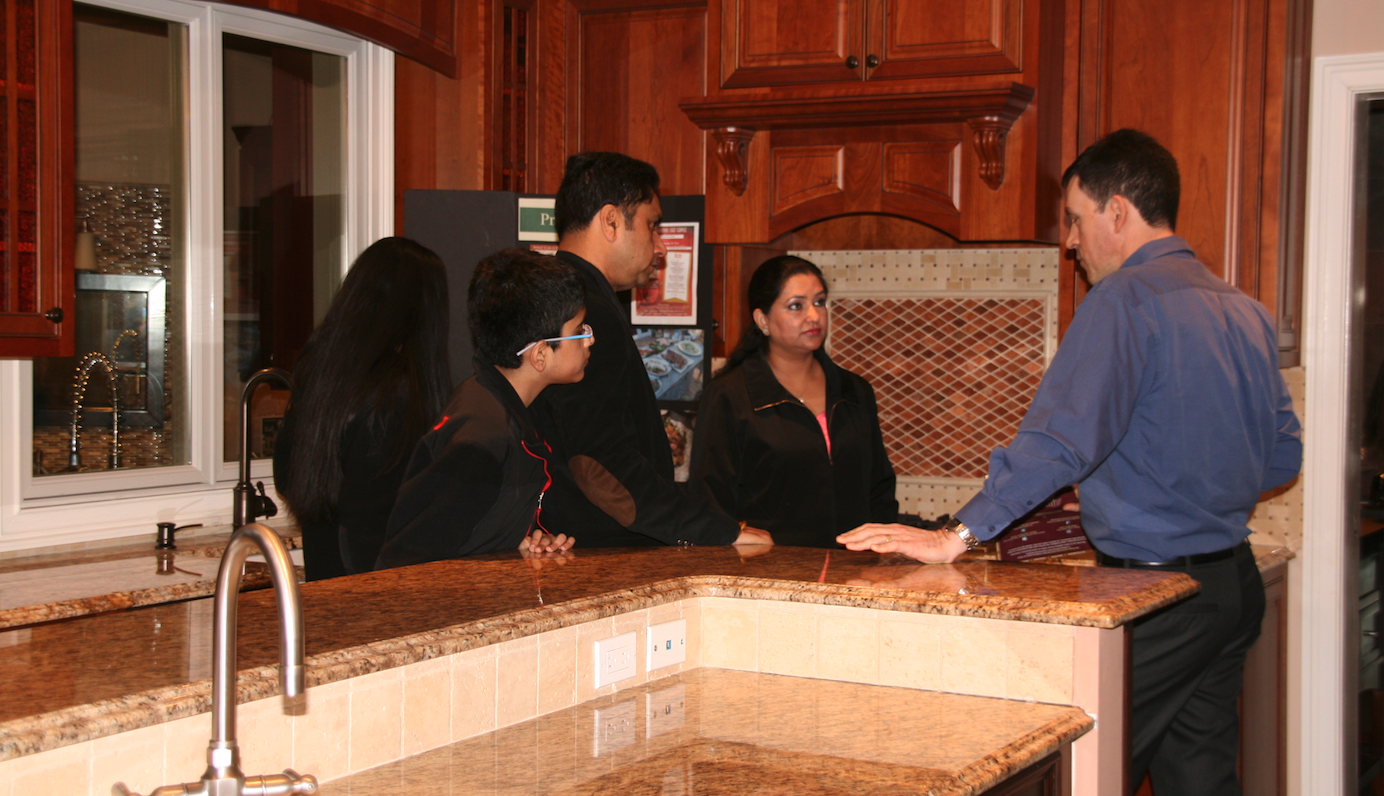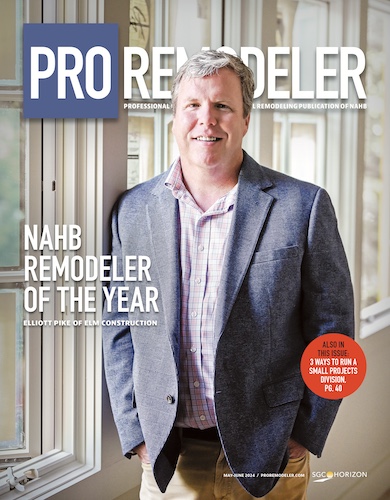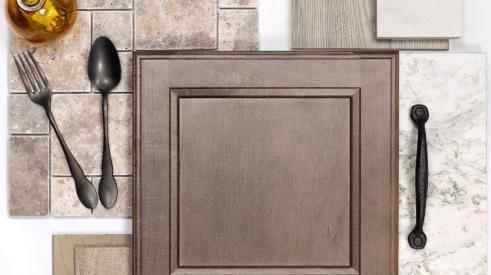Bud Dorman understands that when it comes to a retail showroom, smell matters. In fact, he notes, it matters a lot, but in subtle ways. This realization came to the president of White Aluminum, a Florida home improvement company, the first time he walked into a showroom where scented candles were burning. He got onboard with the idea. “I tried it upfront and we started getting comments from customers,” Dorman notes. “The customers remembered that good smell.” They liked being there. Vanilla or sandalwood, Dorman says, is preferred in the company’s 14 showroom locations.
Double Duty
It’s not always easy for a home improvement company to make a showroom attractive. Of course, fail to make it appeal in some way and you may just end up leasing dead space. And the lease is not all you’re paying for. A showroom requires inventory, upkeep, and staffing. And home improvement showrooms are rarely locations that people visit on impulse.
Given the energy and expense involved, home improvement companies have little choice but to find ways of making the showroom an integral part of their marketing and sales operation.
Alure Home Improvements’ showroom, director of marketing Seth Selesnow explains, is really not about the products; it’s about design, promotion, and the opportunity to build the company’s brand—one that is well-known on Long Island. (Watch a YouTube video tour of Alure's shoroom.) Customers may sign for a roofing, siding, or window replacement job—the company also offers kitchen/bath and basement remodels—but to ensure that the project is just what the homeowner wants, “the next step is to get them back in the showroom,” Selesnow says. In  Alure’s three-story, 8,000-square-foot facility, reps use visualization tools on a wall-mounted TV to show clients what their roofing, siding, window, or combination job might look like (photo at right). During that process, customers often change their minds on colors and products. “When we throw it up on the screen, we can avoid mistakes before they happen,” Selesnow says.
Alure’s three-story, 8,000-square-foot facility, reps use visualization tools on a wall-mounted TV to show clients what their roofing, siding, window, or combination job might look like (photo at right). During that process, customers often change their minds on colors and products. “When we throw it up on the screen, we can avoid mistakes before they happen,” Selesnow says.
Showrooms don’t come cheap. There is, he notes, a huge overhead cost in operating a showroom that size. But then there are the benefits. Besides drawing walk-ins and helping to close deals, it’s a venue for the in-store events that Alure sponsors, one in August, one in January. The two-day events draw hundreds of qualified prospects to meet company personnel, talk about possible projects, and sit in on Alure remodeling seminars. And then there’s the massive once-a-year “Caribbean Party” held to acknowledge and thank customers who supply the company with referrals.
Showroom events can be a major lead generator for home improvement companies. “We have enough space here to entice people, even if the weather gets nasty,” says Miles Wilkins, owner of The Board Store Home Improvement, in LaCrosse, Wis. The Board Store schedules its show to begin just before the two big southwest Wisconsin home shows in late winter. The company advertises its event as the “Home Show Open House,” held in its 3,500-square-foot facility that, in addition, features nine full sunrooms by several manufacturers.
Seat of Authority
Many home improvement companies meet prospects through event marketing, and what better place than the company’s own facility. Companies may offer show specials, raffle off products, even set up live radio broadcasts, something that Midwest Construction, in Des Moines, Iowa, has been doing for 20 years. What started back then as an annual event, says vice president of sales and marketing Paul Despenas, became biannual, then monthly. Today Midwest Construction’s biggest showroom event is its Get Ready for Winter special, in October, which features on-location broadcasting by DJs Van & Bonnie of WHO 1040 AM radio.
In Orange County, Calif., Reborn Cabinets, has made its seminars on kitchen/bath remodeling the anchor point of its marketing campaigns. Every six weeks an average of anywhere from 180 to 200 people assemble in Reborn’s 10,000-square-foot showroom to find out everything they need to know about remodeling their kitchen or bathroom. Though many kitchen and bath companies operate showrooms—where product selection and design take place—Reborn has repurposed its facility and turned it into a major lead generator. But that didn’t just happen on its own. “Ten years ago, we had a smaller facility with maybe five or six vignettes,” president Vince Nardo explains. “We made a commitment to build a much larger showroom and create a brand around the showroom.” With three showroom locations, soon to add a fourth, the company’s marketing draws interested homeowners to the seminars, and the seminars often enough sell them on an in-home sales visit. When it comes to setting expectations, the showroom interaction “ensures zero confusion,” Nardo says. The events include a radio station broadcasting on-site, free lunch, and chefs in action, on the premises.
“All that activity creates a buzz,” Nardo says. And the buzz either brings them in, or urges them to the next stage in the buying cycle. Prospects who attend seminars are twice as likely to buy from Reborn as those who don’t attend but simply have a salesperson come out to their house.
 In addition to showing various product offerings, Reborn Cabinets, in Orange County, Calif., uses its showrooms as the location for its seminars on kitchen/bath remodeling. Photo: courtesy Reborn Cabinets
In addition to showing various product offerings, Reborn Cabinets, in Orange County, Calif., uses its showrooms as the location for its seminars on kitchen/bath remodeling. Photo: courtesy Reborn Cabinets
Value of the Showroom
For home improvement companies committed to showroom marketing, operating a retail facility:
- Confers legitimacy. A retail showroom, and the obvious investment that conveys, communicates seriousness, a reassurance that someone will be there to handle service issues should they arise, and longevity. “If you’ve been in the same location for more than 50 years, that means you’re doing something right,” Despenas says. “It means a lot to homeowners.” Others confirm that the legitimacy issue—in an industry ranking high on consumer complaint lists—is big. “It validates us as a company,” Nardo says. For roofing, siding, and window contractors, the legit factor is especially powerful, since most exterior contractors don’t maintain showrooms, and a showroom says that the company will service the work it installs.
- Takes the project from concept to reality. If customers of window, siding, and sunroom contractor Midwest Construction remain undecided after a sales call, a showroom visit goes a long way toward helping them make up their mind. “You can take a window sample into someone’s house,” Despenas says. “After the third contractor, they’re not remembering much of what anybody said. But if they see your operation, with full-size displays, and your Better Business Bureau Integrity awards …” That can seal the deal. Showroom displays let customers touch and feel what they would otherwise be forced to imagine. For instance, a couple recently bought a sunroom from Midwest Construction only after seeing the company’s showroom displays and satisfying themselves that the finished room had minimal visible fasteners.
- Allows companies to reach out to past customers or unsold prospects. Showroom events become the perfect reason for reconnecting. Combined with special offers, they make a point. Reborn reaches out via mail and email to its database of unsold clients, inviting seminar attendance. If those contacted show up, they get a coupon which, when signed by a company representative, is good for $500 off on the already-quoted cost of the project.
- Can be made to pay for itself. Showrooms generate walk-in leads, but that’s rarely, if ever, the only reason to open and maintain one. They tend to be a side benefit of showroom marketing, and measured against the total overhead cost of a showroom, those lead costs would be prohibitive if companies didn’t find other ways to make a showroom facility justify its existence. For example, management at White Aluminum, which sells sunrooms, windows, and pool and patio covers, knows it will lose a certain percentage of that business to one-truck contractors and DIYers. So why not get at least some portion of it by selling those contractors and DIYers products? Such sales easily cover overhead at the company’s showroom locations. “If you’re worried about showroom costs, you’re not seeing the forest for the trees,” White Aluminum’s Dorman says. “Showrooms cover themselves. We have that on our P&L: retail material and wholesale material.” For example, more 10 percent of the $7 million in sales at the company’s Leesburg, Fla., flagship location are over the counter.
 For Alure Home Improvements, the showroom has other advantages besides drawing walk-ins and helping to close deals. Photo: courtesy Alure Home Improvements
For Alure Home Improvements, the showroom has other advantages besides drawing walk-ins and helping to close deals. Photo: courtesy Alure Home Improvements
Our Job Is to Get a Lead
Seminars, events, and closing sales are all functions that make showrooms valuable. That’s not to forget the basic reason, which is turning the building that houses your corporate office into another lead source. In addition to rotating sales reps, Midwest Construction’s showroom in Des Moines—a 60-by-35-foot facility with two sunrooms attached—is staffed by “myself, the assistant sales manager, and the office manager,” Despenas says. “And, our job is to get a lead.” That is, create enough interest on the part of walk-ins that they agree to a sales visit. White says that the key is having ample space, plenty of product on display, an attractive aroma that hits visitors the second they walk in, and that “the person you have behind the counter is someone who is trained to sell the appointment.”
---
Philadelphia-based freelance writer Jim Cory specializes in covering the remodeling and home improvement industry. Reach him with comments or story ideas at coryjim@earthlink.net.
For all its bricks-and-mortar connotations, home improvement retailers find the showroom concept far from obsolete
Add new comment
Related Stories
3 Areas Successful Remodelers Focus On
Industry advisor Mark Richardson shares what separates the losing from the winning in today’s market
Peppermill Finish
10 Different Questions You Should Ask Potential Clients
Mark Richardson says you need to rethink the questions you ask potential clients and the way in which you ask them
Pro Remodeler’s 2024 Pinnacle Experience Reaches New Heights
The sold-out event covered leadership, lead gen, sales, and technology
Brian Gottlieb Receives Remodeling Mastery Award
Presented by industry icon, Mark Richardson, the award celebrated Gottlieb’s extraordinary impact on remodeling
5 Counterintuitive Strategies to Improve Your Business
Follow these strategies to inspire employees, instill trust, and beat the competition
10 Remodeling Sales Techniques for 2024
Mark Richardson explains the benefits of visual selling, strategic questioning, intentional messaging, and more on this episode of Remodeling Mastery
3 Ways to Start and Operate a Successful Handyman Division
So, you want to start a small projects division? Three successful remodelers lay out their winning approaches and hard-learned lessons
6 Results-Proven Marketing and Sales Tips for Contractors
The Pinnacle Experience’s keynote speaker, author of "They Ask, You Answer" offers results-driven tips contractors can start today for improved leads
How to Get More Leads with a Stronger Remodeling Brand
Discover how to build a strong brand for your construction company, and learn key strategies to differentiate and attract better leads













